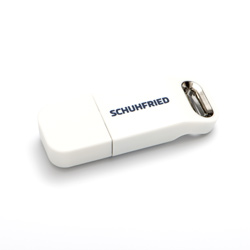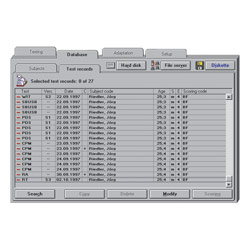Schuhfried Vienna Test System
Model 64032
The Schuhfried VTS enables computer-assisted application of a large number of highly diverse psycho-diagnostic tests and measuring procedures. In developing the system much emphasis was placed on transparent structure and largely uniform design. It is therefore simple to operate and easy to understand and does not require any special computer skills. This VTS basic module is required for administration of any of the available tests.
The Schuhfried VTS supports the administration of both single tests and test batteries. Many of the single tests are available in different test versions. These test versions may differ, for example, in terms of test duration or difficulty or may be parallel forms. They are characterized by different parameters reflecting specific test requirements. They have been designed for administration to a specific population (e.g. psychiatric patients, children, etc.) or for special measuring purposes (e.g. repeated measurements). Test batteries are compiled from the available single tests and test versions.
Once the tests, test versions, or a test battery have been selected, the data is entered and the test program is started. Every test starts with instructions for the test subject which are usually displayed on the screen. In some cases - particularly with procedures on peripheral devices or in testing children not yet able to read - such instructions may have to be given orally by the test administrator.
The next stage is the practice phase which ensures that the subject has understood the instructions. If a subject is not able to solve the tasks, he will be offered help. If he fails several times, he will be asked to contact the test administrator. In questionnaire-type tests completion of the items presented is usually so easy that difficulties will hardly ever arise. In tests requiring the subject to perform more complex tasks the instruction phase and the practice phase are frequently linked up and comprise several stages in conformity with the principles of programmed learning. This ensures that subjects will quickly understand what they are supposed to do.
Next comes the test phase which continues automatically until the end of the test. If the examiner has a test system with a separate monitor for the test administrator, they will be able to carefully monitor test progress while already obtaining relevant diagnostic information, e.g. response tendencies. When a test or test battery has been completed it may be scored immediately.
The computer summarizes the raw scores obtained and performs a comparison against norms. The results are compared against an overall sample or a selected sub-sample based on age, gender or level of education. For some tests representative normal samples are available: in most cases, as a minimum, a number of comparative samples (e.g. adults, children, psychiatric patients) are available. The results may be displayed in summary form on the screen or printed out.
The printed results display the normal and comparative sample(s), raw and standard scores (usually percentile ranks and T-scores), and, if reliabilities are available, the confidence intervals of the standard scores. The raw scores of all non-standardized control variables and response time are shown in the Additional Results table.
Specifications
The following specifications refer to a typical Test System configuration.
Minimum Computer System Requirements
- PC or laptop with Pentium CPU (or compatible, e.g. Athlon), at least 1 Ghz
- At least 500 megabytes (MB) of RAM
- Display adapter with 24 or 32-bit color depth (16 million colors)
- 16-bit sound card with speakers and / or headphones
- DVD drive, hard disk, mouse, keyboard
- USB ports for license dongle and peripheral hardware (in case all USB ports on the PC are used up a USB hub with external power supply is required)
- Network adapter to connect the PC to a data network (e.g. for the installation of a Vienna Test System Network)
- Windows 2000, XP, Vista
- Internet Explorer 7.0 or higher
Please ensure that no programs which can interfere with the test presentation (e.g. by heavy CPU usage or on-screen presentations) are running at the time of presentaton of VTS tests!
Monitor Requirements
- 15" to 19" CRT or LCD color monitor
- A refresh frequency of at least 75 Hz has to be set for CRT monitors.
- With flat panel LCD monitors the following has to be considered:
- We recommend using flat panel LCD monitors with a resolution of at least 1280x960 pixels.
- For technical reasons a light pen can not be used with a flat panel LCD monitor. A device with a built in touch screen can be used instead. Please contact us for advice regarding suitable equipment.
- For measurements of reaction time (e.g. with DT, RA, RT) a monitor has to be used which is working synchronously with the graphic card. The rise+fall response time of the monitor must not exceed 25 milliseconds and a display delay of exactly 4 milliseconds is preferable. Please contact us for advice regarding suitable equipment.


